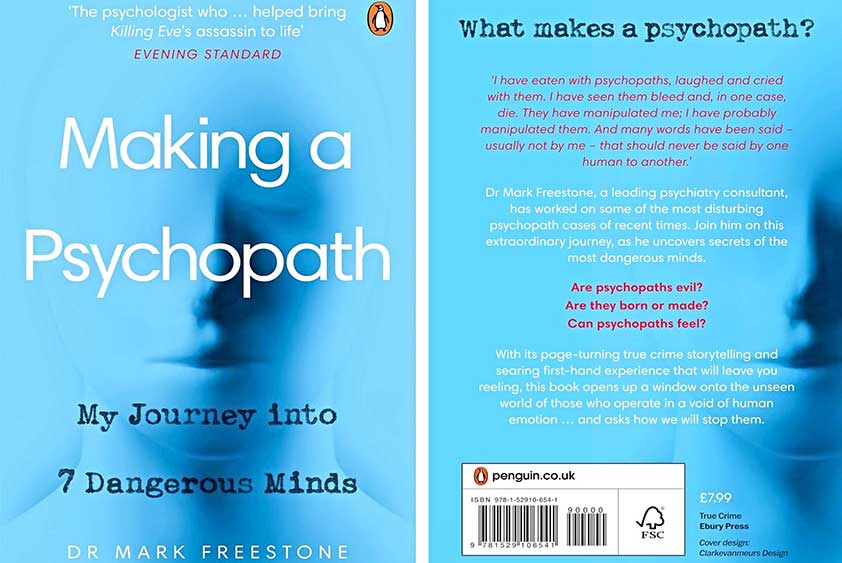
Title: Making a Psychopath
Author: Dr Mark Freestone
Year: 2020
Publisher: Ebury Press
“I think a lot of psychopaths are just geniuses who drove so fast that they lost control.” ―Criss Jami, Killosophy
Dr Mark Freestone takes us on a journey to try to solve some of the most dark and interesting questions of all time:
- Are psychopaths evil?
- Are they born or made?
- Can psychopaths feel?
Freestone is a leading psychiatry consultant and will try to answer these questions through years of experience working and talking with some of the most disturbed minds in our society. In his book, he shares seven stories about some criminals who changed his mind and his way of understanding psychopathy.
Are you ready to learn more about psychopathy? Let’s jump into this book review and some key points that will make you question your beliefs about them and even make you wonder if you could be one of them!
Are Psychopaths Born or Made?
“A psychopath can tell what you’re thinking but what they don’t do is feel what you feel. These are people without a conscience.” ―Robert D. Hare
You will see this question in every single book and article about psychopaths and criminals in general, but you will never see a straight answer.
The National Library of Medicine defines psychopathy (2014):
“A neuropsychiatric disorder marked by deficient emotional responses, lack of empathy, and poor behavioral controls, commonly resulting in persistent antisocial deviance and criminal behavior.”
In other words, extremely antisocial behaviour and a lack of empathy and remorse for their acts. Now, this condition can be seen from two sides, one is related to our genes and DNA, and the other is related to our environment.
Freestone mentions how all these criminals had a tough childhood and how this affected their brain and their conduct. So, we can argue that psychopathy is a mix of certain personality traits and a toxic environment.
This definition helps people and professionals paint a bigger picture of the subject when talking about this condition and how to help psychopaths get better.
And in case you do not believe, James Fallon is a very successful and respected neuropsychologist who once, while working, saw the structure of a brain and parts of it that were more developed than others and said to himself: “This brain is from a psychopath.”
There was no doubt in his words, but it turned out to be his brain. So, if he has a “psychopath brain” why is he not one? Perhaps he shares some of their traits and personality. His upbringing was healthy enough, perhaps to succeed at his profession, as he did, you need a brain like this one. Too many questions, too few answers.
Are Jails and the System Helpful?
“He lives down in a ribcage in the dry leaves of a heart.” ―Thomas Harris (“The Silence of the Lambs”)
Some of the stories mentioned in the book refer to criminals who ended up, either, getting better or even worse because of jail. These people must be penalised for their actions, that is for sure, but prison should be a place to rehabilitate criminals, or at least, not make them worse.
Another interesting case in the book is about a criminal who was labelled a psychopath but who Freestone thought could be autistic and could have been mislabelled by the wrong context and the wrong people.
So, are we doing the right thing by using tests that can fail or can tell only half the truth to label them, and then send them to a place which can worsen their condition?
Eddie, the Redeemed
“It’s hard to recognize the devil when his hand is on your shoulder. That’s because a psychopath is just a person before he becomes a headline.” ―Becky Masterman
The last case in the book is about Eddie, a psychopath, a criminal, and a “waster” who was able to find light. Freestone was amazed by Eddie and his case; he had a horrible past and made mistake after mistake.
Some important points to note about his case are the following:
- He ended up asking for help from a psychologist, who basically saved his life, something which can be quite hard because of his condition and case, some professionals tend to avoid working with people like this.
- He found the way to the light, which is the most important part of the story that can give people hope. Even when they are at rock bottom, there is always a way up.
- He felt bad for his actions, when talking to Freestone he started talking about his past and how disgusted he felt about it… but, can this be real? Psychopaths cannot feel remorse or that is what we think.
So, was Eddie a psychopath or just another victim of bad genetics, bad environment and bad luck in life?
Conclusions
“I don’t really like you, but I’m so good at acting as if I do that it’s basically the same thing.” ―Lisa Scottoline (“Every Fifteen Minutes”)
This review should be used to elicit more conversations about psychopathy and what we are doing to help their victims and themselves. Reading the book, we begin to see that there are more questions and cases that question what we think we know about psychopathy.
Things like its definition, the difference between male and female psychopathology the function of jails and tests, how some people can have their same personality traits but are not even close to be criminals, and even why we tend to be so attracted to these people and their lives.
It’s no secret that we can easily become unhealthily infatuated and then make movies and documentaries about these characters, which we can find on Netflix. Anyway, I hope you like this book review of “Making a Psychopath” and I encourage you to learn more about this great book, let us know your thoughts about it in the comments below.









